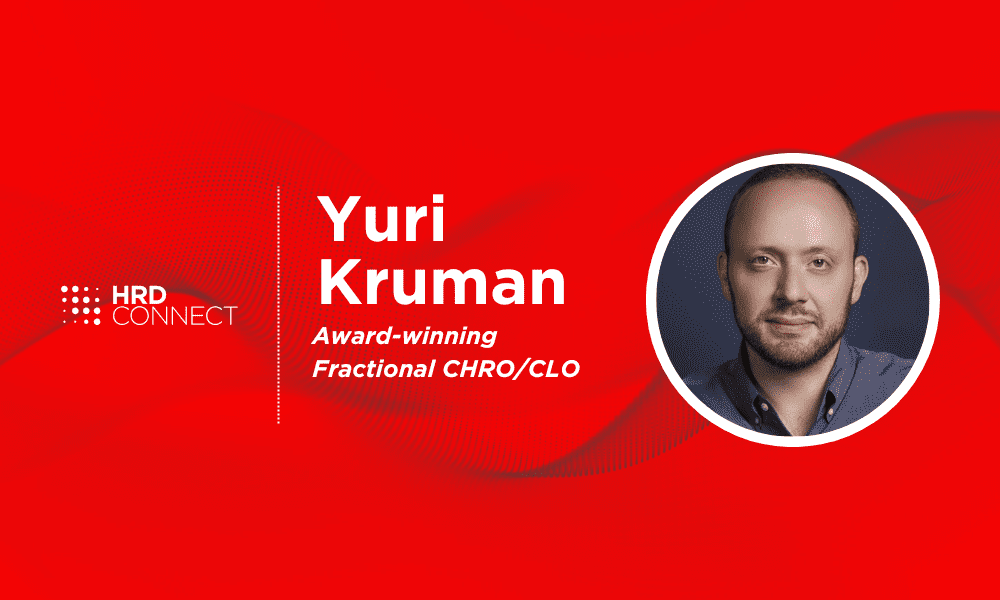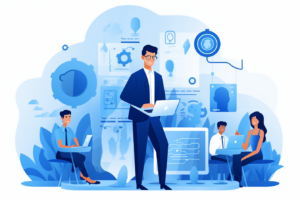How AI customization is re-defining the L&D-talent management relationship
- 6 Min Read
With rising expectations for learning programs, the dawn of AI, and the ongoing struggle for top talent, the relationship between L&D and talent management is undergoing a profound transformation. Yuri Kruman explores how AI customization is reshaping the L&D-talent management relationship and the implications it holds for the future of workforce development.
- Author: Benjamin Broomfield
- Date published: Jun 1, 2023
- Categories

E-Learning providers place the average completion rate of online L&D courses anywhere from 20 to 30%, to 13%, and even as low as 5%. Despite a huge variety of LMS software available on the market, L&D programs are not meeting employee expectations. But with the advent of AI customization, how is this technology impacting the promise of a highly customizable employee experience?
As a fractional CHRO/CLO for many fast-growing organizations, and CEO of HR, Talent & Systems Consulting, Yuri Kruman is already witnessing AI reshape not just learning, but all areas of the employee lifecycle that impact talent management. In this Q&A with HRD, Yuri reveals how AI is the tip of the iceberg for a new generation of highly customized L&D, and how this is impacting the battle for talent.
1. Is AI customization positively impacting talent management?
Yuri: Firstly, there’s a lot of confusion. We see a lot of extreme views that AI is either the best thing since sliced bread or the end of civilization. The truth is somewhere in the middle. Automating manual tasks doesn’t mean that everyone will be out of a job. It just means people need to upskill and reskill; to learn how to prompt AI to do certain parts of their jobs a lot faster.
We see a lot of revolutions throughout history. There’s a lot of precedent. But the pace of change is a lot faster this time. We have to adjust, perhaps, a lot more quickly. The advent of AI customization means management and leaders will expect a lot more productivity.
I’m fortunate to see a lot of people building AI customization tools for the talent management and L&D space. These tools are helping people to create custom career paths and accelerate the time to complete certification. It’s closely tied to even long before onboarding, with recruiting, employer brand, and interviewing. It’s going to create a much more customized path for everyone.
But it may mean that those we leave behind in the talent wars are going to be at a massive disadvantage, not just a small one.
2. How is it impacting the relationship between talent management and L&D?
Yuri: Expectations are going to be a lot higher. Corporate L&D deservedly has a reputation for being backward, whether it’s because of an overreliance on LMS and learning technologies, not enough work on customization, or even throwing money at something that requires smarter investment.
As expectations rise for — and from — employees, talent will say the days of nonsense L&D that don’t serve them are done. Either you present a custom career path and L&D, or employees will leave. That is the pressure from below.
The pressure from above is the eternal demand for top talent. If talent management leaders can’t manage these two pressures, because they don’t have the tools or skills, they’re going to have to rely on the builders. They will need the lower levels of L&D employees to research the latest tools and best practices. Hopefully, over time, the cost of these tools will go down and we will have a golden age of highly customized L&D. But it’s going to be hard for the executives managing this process.
3. Why do HR leaders sometimes struggle to encourage investment in AI for areas such as talent management?
Yuri: It’s worth noting that historically, most C-Suite leaders are not coming from an HR background. There’s already a massive disadvantage in coming from an HR background and trying to make a “business case” for L&D, culture, or talent management.
Many leaders are starting way behind, without a budget. Not in every company, but too often, HR can be seen as a cost center. The mission of HR leaders should be to empower people, – including themselves, and support each other in this process. We’re already seeing it in Fortune 500 companies and tech start-ups where the talent is pushing for more support. But HR leaders have to help each other develop a voice that comes from a place of power, not reactivity.
4. How is AI customization shaping the way organizations design their talent management teams and the stakeholders they interact with?
Yuri: There’s a very positive trend here. Over the past five years, more top talent is coming into the HR and L&D functions. Part of that is because there’s a lot more VC money in HR tech. As more of these people come into the HR world, conditions change. There is a lot more focus on areas such as design, tech stacks, and strategic planning. This plays well with the wider adoption of AI customization.
You have better-trained talent who are tech-savvy and comfortable with areas such as AI prompting. For example, someone who can use AI to design a custom learning path for a Director of Sales at a particular company in a particular stage with a particular set of experiences. Companies with huge internal data sets are going to have tremendous insights on building custom learning paths, and what works to retain and develop people.
That’s also going to impact whom they hire. There’s already a call to focus on early to mid-level employees in the People Operations function to be more data-driven. The next level will be AI and prompt engineering capabilities.
5. Should HR leaders be wary of a flood of AI tools for talent management and L&D?
Yuri: I speak with around 15 to 20 vendors on an average week. A lot of them have a push towards custom learning paths and faster certification. The biggest problem is that such a high proportion of people don’t complete L&D courses or programs.
So, in response to one-to-one coaching that isn’t scalable despite what employees are demanding, the solution will be a custom direction for everybody. In the next 18 to 24 months, we’ll see the front-runners.
6. How do you foresee the practice of talent management changing in the future of work?
Yuri: Of course, AI is important and talent leaders can achieve customization through AI. I think the best companies will pay more granular attention to each employee, all the way through the candidate interview process. There’s going to be more customized outreach from recruiters to candidates. At scale, teams will use specific, predictive messaging for each passive candidate. Everything will be customized as much as possible.
________________
Yuri is an award-winning Fractional CHRO/CLO for fast-growth companies and has been named as a Top 122 CHRO in 2022 by peopleHum. He is the CEO of HR, Talent & Systems Consulting (Top 10 HR Consulting Vendor in 2020 per HR Tech Outlook Magazine) and top-rated leadership executive coach. He is the author of the “Be Your Own Commander-in-Chief,” and hosts the “Commander-in-Chief” podcast.









